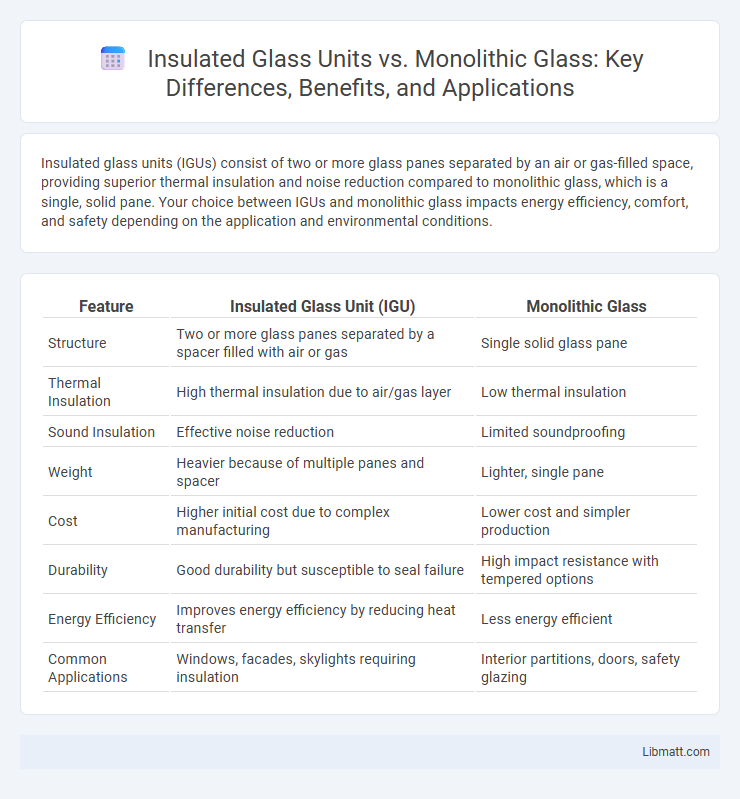Insulated glass units (IGUs) consist of two or more glass panes separated by an air or gas-filled space, providing superior thermal insulation and noise reduction compared to monolithic glass, which is a single, solid pane. Your choice between IGUs and monolithic glass impacts energy efficiency, comfort, and safety depending on the application and environmental conditions.
Table of Comparison
| Feature | Insulated Glass Unit (IGU) | Monolithic Glass |
|---|---|---|
| Structure | Two or more glass panes separated by a spacer filled with air or gas | Single solid glass pane |
| Thermal Insulation | High thermal insulation due to air/gas layer | Low thermal insulation |
| Sound Insulation | Effective noise reduction | Limited soundproofing |
| Weight | Heavier because of multiple panes and spacer | Lighter, single pane |
| Cost | Higher initial cost due to complex manufacturing | Lower cost and simpler production |
| Durability | Good durability but susceptible to seal failure | High impact resistance with tempered options |
| Energy Efficiency | Improves energy efficiency by reducing heat transfer | Less energy efficient |
| Common Applications | Windows, facades, skylights requiring insulation | Interior partitions, doors, safety glazing |
Introduction to Insulated Glass Units and Monolithic Glass
Insulated Glass Units (IGUs) consist of two or more glass panes separated by a sealed air or gas-filled space to enhance thermal insulation and reduce energy consumption in buildings. Monolithic glass refers to a single, solid pane of glass commonly used for windows, doors, and facades but offers limited thermal performance compared to IGUs. The choice between IGUs and monolithic glass significantly impacts energy efficiency, noise reduction, and overall building comfort.
Understanding the Structure: Insulated vs Monolithic Glass
Insulated glass units (IGUs) consist of two or more glass panes separated by a spacer filled with air or inert gas, enhancing thermal insulation and reducing energy loss. Monolithic glass is a single, solid pane without any spacer or air gap, offering basic transparency but limited thermal and acoustic performance. The multi-layered structure of IGUs significantly improves insulation compared to the singular composition of monolithic glass.
Thermal Performance Comparison
Insulated glass units (IGUs) consist of two or more glass panes separated by a spacer filled with air or inert gas, providing superior thermal insulation compared to monolithic glass. IGUs significantly reduce heat transfer, achieving U-values as low as 0.15 to 0.30 W/m2K, whereas monolithic glass typically exhibits U-values above 5.0 W/m2K. This enhanced thermal performance in IGUs minimizes energy loss, improves interior comfort, and lowers heating and cooling costs.
Energy Efficiency and Insulation Benefits
Insulated glass units (IGUs) consist of two or more glass panes separated by a gas-filled space, significantly enhancing your home's energy efficiency by reducing heat transfer and minimizing energy loss compared to monolithic glass. The multiple layers in IGUs provide superior thermal insulation, resulting in better temperature regulation and lower heating and cooling costs, while monolithic glass offers minimal insulation as a single pane. Choosing IGUs supports improved indoor comfort and energy savings through advanced insulation benefits that monolithic glass cannot match.
Soundproofing Capabilities
Insulated glass units (IGUs) provide superior soundproofing capabilities compared to monolithic glass due to their multiple layers and air or gas-filled space between panes, which effectively dampens noise transmission. The combination of laminated glass within IGUs further enhances acoustic performance by reducing both airborne and impact noise. You can significantly improve your indoor sound insulation by choosing insulated glass units over single-pane monolithic glass.
Durability and Lifespan Differences
Insulated glass units (IGUs) offer superior durability compared to monolithic glass due to their multi-layer construction, which provides enhanced resistance to thermal stress and impact damage. The sealed air or gas-filled space between panes in IGUs prevents condensation and reduces heat transfer, significantly extending the lifespan beyond that of single-pane monolithic glass. Your investment in IGUs ensures longer-term performance and increased resistance to environmental wear and tear.
Cost Considerations and Long-Term Savings
Insulated glass units (IGUs) typically have higher upfront costs compared to monolithic glass due to their multi-pane construction and incorporated air or gas layers for improved thermal performance. However, IGUs offer significant long-term savings by enhancing energy efficiency, reducing heating and cooling expenses, and minimizing condensation issues. Choosing insulated glass can improve your property's overall value while lowering utility bills over time, balancing the initial investment with sustained financial benefits.
Applications and Suitability in Building Design
Insulated glass units (IGUs) are ideal for energy-efficient building designs due to their superior thermal insulation and noise reduction, commonly used in windows, facades, and curtain walls. Monolithic glass, being a single pane, suits applications requiring high strength and clarity, such as interior partitions, doors, and low-rise windows where insulation is less critical. Selection depends on project requirements for energy performance, safety, and aesthetic preference, with IGUs favored in climates demanding insulation and monolithic glass in simpler, cost-sensitive designs.
Aesthetic and Design Flexibility
Insulated glass units (IGUs) offer superior aesthetic and design flexibility compared to monolithic glass due to their multi-pane construction, which allows for variations in glass types, coatings, and gas fills to enhance appearance and performance. IGUs enable slimmer frames and larger glass spans without compromising strength, providing architects and designers with more creative freedom for modern building facades. Your choice of IGU can dramatically enhance natural light diffusion and thermal comfort while maintaining a sleek, contemporary look.
Choosing the Right Glass Solution for Your Project
Insulated glass units (IGUs) provide superior thermal performance and sound insulation compared to monolithic glass, making them ideal for energy-efficient buildings and noise-sensitive environments. Monolithic glass, typically single-pane, offers simplicity and lower initial cost but lacks the insulating properties necessary for modern energy standards. Selecting the right glass depends on project requirements such as climate control, budget constraints, and desired durability, with IGUs favored for long-term energy savings and monolithic glass chosen for cost-effective, straightforward applications.
Insulated glass unit vs monolithic glass Infographic

 libmatt.com
libmatt.com